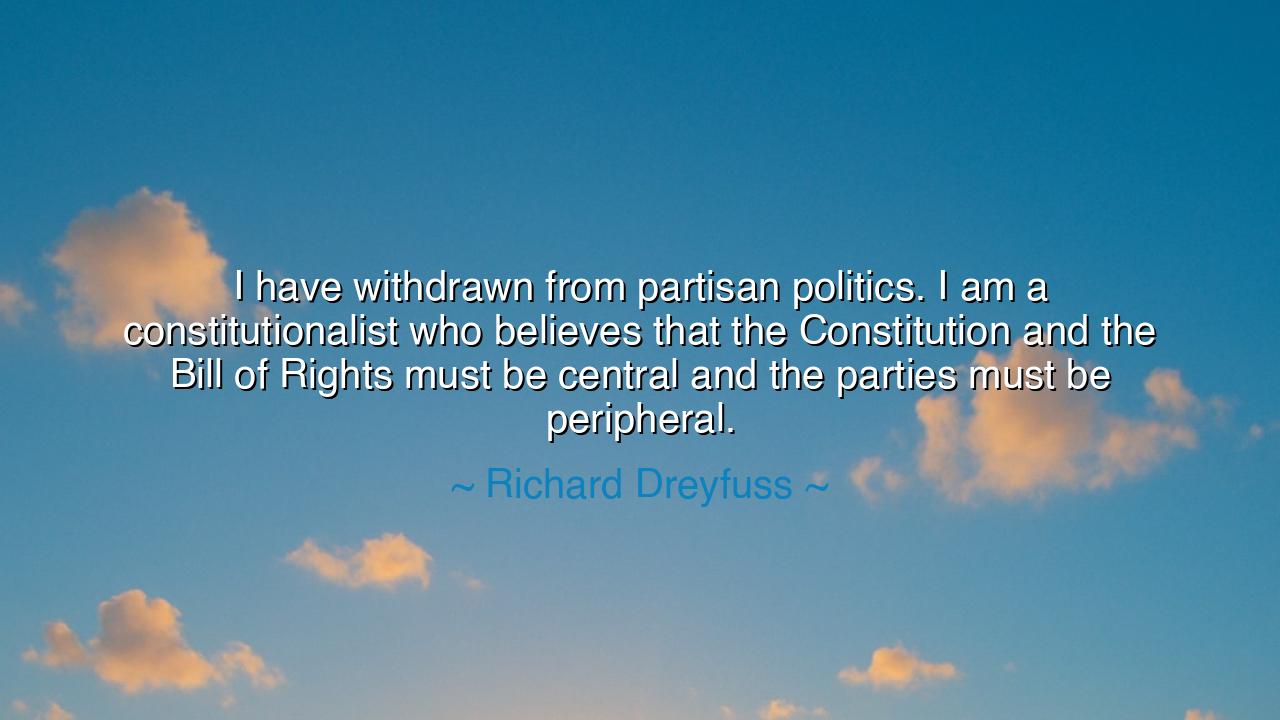
I have withdrawn from partisan politics. I am a
I have withdrawn from partisan politics. I am a constitutionalist who believes that the Constitution and the Bill of Rights must be central and the parties must be peripheral.






Principle must always stand above faction. When Richard Dreyfuss declared, “I have withdrawn from partisan politics. I am a constitutionalist who believes that the Constitution and the Bill of Rights must be central and the parties must be peripheral,” he spoke as one seeking the higher truth of governance, beyond the shouting and chaos of political tribes. His words carry the weight of one who has seen how loyalty to parties can corrode loyalty to a nation’s founding ideals. In them lies a call for unity through principle, urging future generations to remember that the Constitution is the sacred foundation, while political parties are merely tools—useful, but never supreme.
At the heart of this teaching is a profound distinction between partisan politics and constitutional governance. Partisan politics thrives on division. It seeks victory for one side, often at the cost of truth and justice. The Constitution, however, was forged to unite a diverse people under shared laws and liberties. When parties become central, the nation risks descending into endless conflict, where power matters more than principle. Dreyfuss’s words remind us that true patriotism is not found in defending a party’s banner, but in defending the enduring rights and freedoms that belong to all citizens.
History provides powerful lessons about this balance. In the early days of the American Republic, George Washington, in his farewell address, warned against the rise of factionalism. He feared that parties, if left unchecked, would become “potent engines” by which cunning men could divide and weaken the nation. His warning proved prophetic, as later generations witnessed the Civil War—a conflict fueled, in part, by the failure of political factions to resolve their differences within the framework of the Constitution. Washington, like Dreyfuss, understood that the centrality of principle is the only shield against chaos.
Consider also the example of Abraham Lincoln, who, though leader of the Republican Party, always placed the Union above party interests. During the darkest days of the Civil War, Lincoln even appointed political rivals to his cabinet, understanding that saving the nation required transcending partisanship. His actions reflect the very wisdom Dreyfuss describes: parties must serve the Constitution, not the other way around. When party loyalty eclipses national duty, the republic itself stands in peril.
Dreyfuss’s withdrawal from partisan politics is not an act of retreat, but one of moral clarity. It is a statement that true strength lies not in joining the noisy armies of left or right, but in standing firm at the nation’s core, guarding the rights and freedoms that define it. This path is difficult, for it often leaves one isolated, attacked by both sides. Yet it is the path of the statesman, the philosopher, and the guardian of liberty.
Let this lesson echo through the ages: nations are built on principles, not parties. As Dreyfuss teaches, the Constitution and the Bill of Rights are the eternal stars by which a people must navigate. Parties rise and fall like waves, but the foundation must remain unshaken. Future generations must remember that their highest loyalty is to justice and freedom, and that only by placing these above faction can a republic endure.






AAdministratorAdministrator
Welcome, honored guests. Please leave a comment, we will respond soon